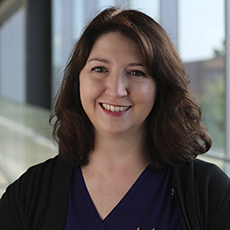Columbus, Indiana 47203

Columbus, Indiana 47203
Professional Summary
As a social psychologist, I study how people influence each other, and specifically examine group processes and marginalized persons/groups. My research focuses on ostracism (particularly sources of ostracism and family ostracism), and prejudice (particularly when control of the stigma is unclear). But, I am also pursuing work on experiences and positive psychology interventions of women in prison. Since 2008, I continue to enjoy teaching a variety of courses, and mentoring student research at IUPUC.
Education
- Ph.D. Social Psychology, Michigan State University, 2006. Coping with ostracism: Which strategies are more effective than others.
- M.A. Psychology, Michigan State University, 2003. Social Ostracism: How people view themselves and others when they exclude and are excluded.
- B.A. Psychology, Purdue University, 2000
Professional Activities
- Member, American Psychological Association
- Member, Midwestern Psychological Association
- Member, Society for Personality and Social Psychology
Courses Taught
- Social Psychology, PSY-B 370
- Research Methods, PSY-B 311
- Capstone Research, PSY-B 471
- Introduction to Psychology as a Social Science, PSY-B 104
- Individual Research and Readings, PSY-B 292 and 492
- Group Dynamics: Theory and Research, PSY-B 376 (every other year)
- Statistics, PSY-B 305 (occasionally)
- Industrial-Organizational Psychology, PSY-B 358 (occasionally)
Administrative & Service Responsibilities
- Director, Psychology Undergraduate Program
- Chair, Faculty Affairs Committee
- Faculty Mentor, First Year Experience
- Faculty Advisor, Psychology Club
- Peer reviewer for scholarly journals: Group Processes and Intergroup Relations; Social Influence; Group Dynamics: Theory, Research, and Practice
Research Activities
My research focuses on the theme of marginalized persons and groups. In my ostracism research I am currently building a theoretical framework about family ostracism. As a multi-disciplinary collaboration with Communication scholars, we are seeking to understand how exclusion experiences in one’s family affect their perspective of themselves, others, and their family communication patterns. In my prejudice work, I collaborate with colleagues regionally to understand how personality traits, and contact experiences predict prejudicial attitudes. Currently, we are examining how stigmas like overweight, sexual orientation, and disability are perceived because there are a multitude of attributions for these stigmas. Finally, I am currently working to understand a marginalized community: women in prison. With collaborators, I am seeking to understand their experiences of ostracism, but more importantly, how positive psychology and resilience training could improve their mental health, and ultimately reduce recidivism.
Publications
- Carmon, A.F., & Poulsen, J.R. Do you feel like a part of your family?: An examination of privacy orientations, family ostracism, family satisfaction, and relational uncertainty. Submitted for review to Communication Studies (August 2013)
- Redick, T.R., Armand, J.* & Poulsen, J.R. Task-Specific Performance Effects with Different Numeric Keypad Layouts. Revised and resubmitted to Applied Ergonomics (July 2013).
- Carmon, A.F., & Poulsen, J.R. (2012). Do you feel left out of your family? An examination of family communication patterns and ostracism. Iowa Journal of Communication: Special issue on communication and family, 44, 1-21.
- Poulsen, J.R., & Kashy, D. A. (2012). Two sides of the coin: How sources and targets of exclusion perceive themselves and one another. Group Processes and Intergroup Relations, 15, 457-470.
- Kerr, N.L., Seok, D.H., Poulsen, J.R., Harris, D.W., Messe, L.A. (2008). Social ostracism and group motivation gain. European Journal of Social Psychology, 38,
- 736-746.
- Jackson, J. W., & Poulsen, J. R. (2005). Contact experiences mediate the relationship between Five Factor Model personality traits and ethnic prejudice. Journal of Applied Social Psychology, 35, 667 – 685.
Civic Engagement
Additional Content
In addition to my work, I enjoy many activities such as fitness; reading; cooking; music; gardening; and spending time with my family. I am always happy to talk with students who are interested in Psychology, research in psychology, or our current students and alumni who may want to connect to campus. Finally, researchers seeking collaboration, reprints/preprints, conference presentations, measures, etc. are welcome to contact me.


